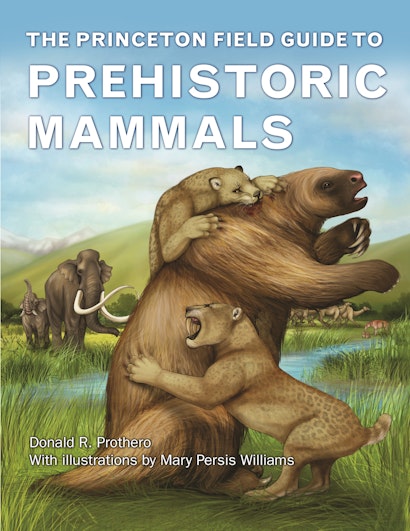After the mass extinction of the dinosaurs 65 million years ago, mammals became the dominant terrestrial life form on our planet. Roaming the earth were spectacular beasts such as saber-toothed cats, giant mastodonts, immense ground sloths, and gigantic giraffe-like rhinoceroses. Here is the ultimate illustrated field guide to the lost world of these weird and wonderful prehistoric creatures.
A woolly mammoth probably won’t come thundering through your vegetable garden any time soon. But if one did, this would be the book to keep on your windowsill next to the binoculars. It covers all the main groups of fossil mammals, discussing taxonomy and evolutionary history, and providing concise accounts of the better-known genera and species as well as an up-to-date family tree for each group. No other book presents such a wealth of new information about these animals—what they looked like, how they behaved, and how they were interrelated. In addition, this unique guide is stunningly illustrated throughout with full-color reconstructions of these beasts—many never before depicted—along with photographs of amazing fossils from around the world.
- Provides an up-to-date guidebook to hundreds of extinct species, from saber-toothed cats to giant mammoths
- Features a wealth of color illustrations, including new reconstructions of many animals never before depicted
- Demonstrates evolution in action—such as how whales evolved from hoofed mammals and how giraffes evolved from creatures with short necks
- Explains how mass extinctions and climate change affected mammals, including why some mammals grew so huge
"With a focus on the 66 million years since the end-Cretaceous extinction stripped away all dinosaurs but birds, Mr. Prothero's book ably demonstrates that mammalian evolution has been just as circuitous and strange as that of the terrible lizards. . . . [This book shows] the unexpected variety that life is capable of and raise[s] the question of what the next 235 million years will bring."—Brian Switek, Wall Street Journal
"In The Princeton Field Guide to Prehistoric Mammals, author Donald Prothero . . . introduces readers to an array of real-life, but seemingly fantastic beasts—extinct mammals."—Mindy Weisberger, LiveScience
"Written by American paleontologist Donald Prothero and beautifully illustrated by renowned scientific illustrator Mary Persis Williams, this publication is a ‘must have' for academics and fans of fossils as well as anyone with an interest in general science. . . . Highly recommended."—Everything Dinosaur
"One of the most important things about this book is that it is fully up to date, and thus, the only current mammalian evolutionary overview that is available, to my knowledge. In some areas of fossil mammal research there has been a lot of work over recent years, so this is important. I highly recommend this excellent book."—Greg Laden's Blog
"Readable and highly informative. . . . I highly recommend this comprehensive and well-illustrated book to non-professionals with proficiency in paleontology and undergraduate students who are interested in the evolutionary history of animals. Furthermore, the book may be a handy guide for professional paleontologists involved in teaching."—Christine Böhmer, Journal of Paleontological Techniques
"Due to Prothero's work with his vivid style of writing mentioning popular prehistoric mammal species (like the giant ground sloth Megatherium, the saber-toothed marsupial Thylacosmilus, or Steller’s sea cow) and Williams’ illustrations this prehistoric world is revived and reminds us how evolution has formed a breathtaking biodiversity of mammals."—Thiemo Braasch, Suiform Surroundings
"The laudable efforts of Prothero to make prehistoric mammals shine in the shadow of the more popular dinosaurs lead to a book that will surprise and delight amateurs."—Jonathan J. Calede, Quarterly Review of Biology
"The Princeton Field Guide to Prehistoric Mammals is a must-have for anyone interested in the fossil history of mammals, in part because works that review the whole of mammal history are otherwise virtually non-existent."—ScientificAmerican.com’s Tetrapod Zoology blog
"Up-to-date, comprehensive, and very readable. Prothero is a renowned expert in this field, with decades of experience working on diverse groups of prehistoric mammals. He clearly knows his subject well and skillfully conveys this knowledge to readers."—Spencer G. Lucas, New Mexico Museum of Natural History and Science
"Prothero knows his fossil mammals."—Christine M. Janis, coauthor of Vertebrate Life

